Read Time: 5 Minutes Subscribe & Share
New Habits And Goals
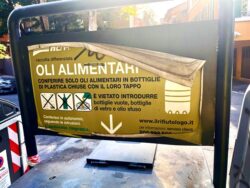 I fancied myself a fairly conscientious environmentalist in my Virginia home. Compost, recycled gift wrap, bottles to the purple dumpster — a good B+ at least. But Bologna is challenging my self- satisfaction. In this city, there are collection points for your used frying oil. You are obligated to separate your garbage into the following separate piles – glass and metal, food leftovers, waste paper and cardboard, plastics, and undifferentiated trash. The additional requirements have made me think more about what we consumers take for granted and how each of us should be more proactive not only in our daily routines but also in our food purchases. Overarching all is the necessity to learn more about the insidious way politics toys with even our best intentions. There has been a proliferation of new documentaries of varying degrees of directorial excellence about how dire our ecological situation is. Some can be seen for free, others demand a streaming fee, and some (like the one in this post) include a sales pitch, During the holiday season might be a good time to watch one of these films and commit to some long-term actions to help better our communities and our planet. This particular film is about three such people.
I fancied myself a fairly conscientious environmentalist in my Virginia home. Compost, recycled gift wrap, bottles to the purple dumpster — a good B+ at least. But Bologna is challenging my self- satisfaction. In this city, there are collection points for your used frying oil. You are obligated to separate your garbage into the following separate piles – glass and metal, food leftovers, waste paper and cardboard, plastics, and undifferentiated trash. The additional requirements have made me think more about what we consumers take for granted and how each of us should be more proactive not only in our daily routines but also in our food purchases. Overarching all is the necessity to learn more about the insidious way politics toys with even our best intentions. There has been a proliferation of new documentaries of varying degrees of directorial excellence about how dire our ecological situation is. Some can be seen for free, others demand a streaming fee, and some (like the one in this post) include a sales pitch, During the holiday season might be a good time to watch one of these films and commit to some long-term actions to help better our communities and our planet. This particular film is about three such people.
A Sales Pitch For A Better Earth
The Need To Grow first introduces a Girl Scout and her mother who spearhead a petition to the Girl Scout leadership (in their swank offices in New York city) to at least offer an organic and non-GMO cookie for resale in future Girl Scout Cookie drives. The second protagonist is a serial entrepreneur who sets out to create a market garden system that can be implemented in urban spaces. The third one is a video game designer (who also worked in the Star Wars film production) who creates a closed loop greenhouse that produces energy, food, and soil-enhancing biochar.
The one element that loosely ties these three dissimilar US citizens is their recognition that if we do not take care of the Earth’s earth, we will destroy our existence and that of the planet’s most endangered resource – our farming soil. When you remove plant debris and animal waste from soil, it becomes desert sand. And we are doing just that. To quote just one article in The Guardian:
The continual ploughing of fields, combined with heavy use of fertilizers, has degraded soils across the world, the research found, with erosion occurring at a pace of up to 100 times greater than the rate of soil formation. It takes around 500 years for just 2.5cm of topsoil to be created amid unimpeded ecological changes.
The current system of industrial farming with chemical fertilizers and herbicides was born out of scientific breakthroughs in World War I and II and the resulting excess of these chemicals afterwards. We are exhausting our arable soil at a rapid rate and the narrator in The Need To Grow gives a grim estimate of 60 years at the current rate of depletion.
Activists & Marketers
Alicia Seratos is now 16, with her own blog about her activities, which include planting fruit trees in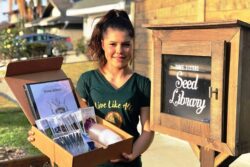 communities, starting seed libraries in schools and wrestling! On her website, she currently provides information on how to start a seed library and offers some insights on other projects she developed. She is quite down to earth and amazing at the same time. She was first featured in The Need To Grow as an eight-year-old Girl Scout, who, along with her troop leader mother, painstakingly collected a petition to impress their cause upon this multi-million-dollar non-profit organization. She and her mother were subjected to a fair amount of corporate harassment and were refused an audience with the President of GSA. But by 2017, the Girl Scout non-gmo S’Mores cookie was introduced into the lineup of what troop members could sell.
communities, starting seed libraries in schools and wrestling! On her website, she currently provides information on how to start a seed library and offers some insights on other projects she developed. She is quite down to earth and amazing at the same time. She was first featured in The Need To Grow as an eight-year-old Girl Scout, who, along with her troop leader mother, painstakingly collected a petition to impress their cause upon this multi-million-dollar non-profit organization. She and her mother were subjected to a fair amount of corporate harassment and were refused an audience with the President of GSA. But by 2017, the Girl Scout non-gmo S’Mores cookie was introduced into the lineup of what troop members could sell.
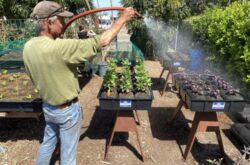 Erik Cutter, whose resume includes a series of entrepreneurial endeavors not mentioned in the film, designed a nutrient-dense soil system contained in a sock-like structure that can be laid out in almost any sort of urban environment – an abandoned space, an unused parking lot, even median strips. He is a frank advocate that our food supply must have a healthy local component to it and that centralized mono crops cannot sustainably feed the masses. He argues for better use of urban spaces to increase access to healthy produce in what we now call “food deserts”. Although this system was experimental while the documentary was being filmed, if you go to the Alegria websites you’ll see several options for his finalized Soxxbox urban garden system. He benefits from knowledge gleaned from the third protagonist of this film. A bit of food for thought: during World War II, 20 million home gardens produced 40% of the food consumed in the US.
Erik Cutter, whose resume includes a series of entrepreneurial endeavors not mentioned in the film, designed a nutrient-dense soil system contained in a sock-like structure that can be laid out in almost any sort of urban environment – an abandoned space, an unused parking lot, even median strips. He is a frank advocate that our food supply must have a healthy local component to it and that centralized mono crops cannot sustainably feed the masses. He argues for better use of urban spaces to increase access to healthy produce in what we now call “food deserts”. Although this system was experimental while the documentary was being filmed, if you go to the Alegria websites you’ll see several options for his finalized Soxxbox urban garden system. He benefits from knowledge gleaned from the third protagonist of this film. A bit of food for thought: during World War II, 20 million home gardens produced 40% of the food consumed in the US.
Michael Smith, the third protagonist, has the most fascinating CV. A software engineer who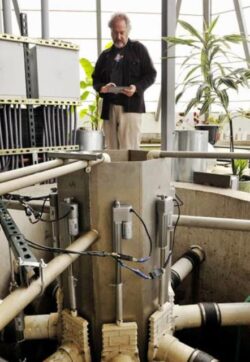 contributed his skills in animation to both films and video games, Smith also has a penchant for the ways regenerative agriculture can be programmed to produce a closed-loop system of farming, soil renewal and energy production. The Need to Grow explores his first efforts and tragic loss of his Green Dragon. This prototype of his current company, Regenitch, housed a biomass “incinerator” that produced biochar and ponds of algae which was fed to the soil. That in turn grows healthier produce and sequesters large amounts of carbon, while creating substantial amounts of energy that can be used to power homes. Several varieties of fruits and vegetables are grown in the cross ladders stretched across the algae ponds. The main object is the production of an intense soil stimulant and carbon-sequestering product, as well as an alternative source for energy needed to replace that produced by fossil fuels.
contributed his skills in animation to both films and video games, Smith also has a penchant for the ways regenerative agriculture can be programmed to produce a closed-loop system of farming, soil renewal and energy production. The Need to Grow explores his first efforts and tragic loss of his Green Dragon. This prototype of his current company, Regenitch, housed a biomass “incinerator” that produced biochar and ponds of algae which was fed to the soil. That in turn grows healthier produce and sequesters large amounts of carbon, while creating substantial amounts of energy that can be used to power homes. Several varieties of fruits and vegetables are grown in the cross ladders stretched across the algae ponds. The main object is the production of an intense soil stimulant and carbon-sequestering product, as well as an alternative source for energy needed to replace that produced by fossil fuels.
The film has lots of holes, some in presenting its research, certainly in the retelling of the three stories. But I did find it somewhat uplifting to watch very different people devise solutions to hinder the devastation our current system of agriculture has wrought. I have high hopes for organic Thin Mints next along with deserted parking lots filled with greens.
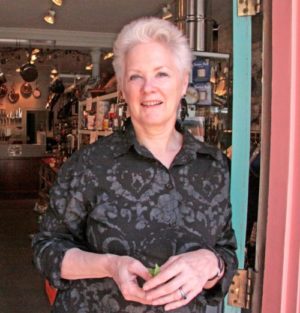
Kitchen Detail shares under the radar recipes, explores the art of cooking, the stories behind food, and the tools that bring it all together, while uncovering the social, political, and environmental truths that shape our culinary world.




Brilliant and entertaining as usual! Thank you, Nancy!
Hello Marilyn!
Thank you! There are quite a number of these documentaries, but this one was so interesting in its portrayal of these three things individuals.
I don’t know how I missed this. Wow. Thank you, Nancy. Is anyone surprised that the chemical use of today follows two world wars that were heavy users of chemicals? Thank you for introducing us to three brave people. I gave up on GS cookies years ago because of the amount of sugar in them.
Gretchen,
Good to hear from you. I have wanted to write further about this Girl scout Cookie phenomenon in the US. And yes, the chemicals prevalent in foods in the US astounded me, once I stared reading about it from even the most even handed scientific sources!
Nancy